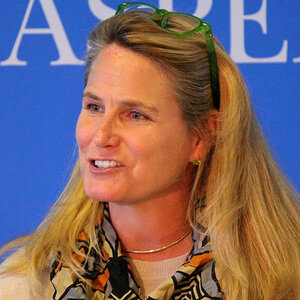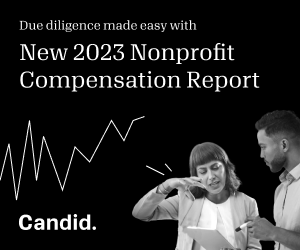The power of engaging parents as real partners

There is an essential ingredient that gives us a real shot at ending the cycle of poverty forever: parents. It is an election year, and we will hear a lot about “doing right by our families,” but one of the best ways we can do right by families is to honor their lived experience by valuing their expertise. That message was at the heart of our Parent Power panel at the 2022 Aspen Ideas Festival: We can all benefit by engaging parents as partners as we design programs meant to keep children and families on a path to prosperity.
Parental involvement in decision making is the key to advancing policies and programs that support families’ strengths and needs.
For example, Connecticut’s Office of Early Childhood now has a Parent Cabinet that started with a manifesto stating: “To ensure that all children have equitable outcomes in education, health, and life, we must view engaging parents and developing their leadership as ‘Mission Critical.’” Colorado’s Department of Human Services has put this into practice with their Family Voice Council in which “[m]embers share their honest experiences and provide feedback as a guide for the future.” The Washington State Department of Children, Youth & Families (DCYF) listens to a Parent Advisory Group which serves as a “sounding board for decisions, ideas and questions that shape the future of DCYF.”
For the past 10 years, Ascend at the Aspen Institute has worked with leaders in these states—as well as across all 50 states, Washington, D.C., and Puerto Rico—to move the idea of centering parent voices and lived expertise from the exception to the rule. The next step for nonprofits and philanthropies is to help more policymakers embrace these three core ideas:
Honor parental expertise.
Nonprofits can help elevate parent voice. Ascend provides a public platform for parent leaders to share their stories and insights and showcase the power of parent voice. And now those parents are being recognized as the leaders they are—speaking at conferences and roundtables, providing an important voice and perspective.
Amber Angel embodies this concept put into action. She first engaged with Ascend while she was a single mother of two and studying at Los Angeles Valley College’s Family Resource Center, where she later worked. Her initial public speaking opportunity was at the first federal 2Gen Conference in May 2016, which Ascend convened in partnership with the U.S. Department of Education, the White House, and seven cabinet agencies. Amber is now a nationally recognized student parent leader, innovator, and adjunct professor. Recently, she became a program officer at the ECMC Foundation, where she leads a portfolio focused on postsecondary success for single moms.
Parent participation is essential—not an afterthought.
Aisha Nyandoro, CEO of Springboard to Opportunities—a nonprofit that connects families living in affordable housing with resources and programs—looked to parents for insights on their experiences and applied their expertise to transform its policies and practices. She launched the groundbreaking Magnolia Mother’s Trust guaranteed income program. “Our families told us a myriad of stories. But every story that we heard could be addressed with cash. I pulled together a roundtable of moms. And I just said, ‘Okay. Just help me dream about what this could potentially be.’”
Ebony Beals, a parent, business owner, and Springboard participant, summed it up best about why this is so important when she said, “I don’t just want to be a voice. I want to be part of the action.”
With parents as partners, we get better results and stronger leaders.
At Magnolia Mother’s Trust, designing the program with single mothers not for them generated immediate results that will pay off for generations. For Cajania Brown, a mother and Magnolia Mother’s Trust recipient,the money helped her pay off debt, raise her credit score, and move into a larger apartment that could better accommodate her growing family. Her economic progress will make life more stable for her children, increasing their educational success.
Parents with lived experience are able to leverage their depth of expertise to become even stronger leaders. Daria Willis, president of Howard Community College in Columbia, Maryland, grew up in a single-parent household and was a single mother herself while she worked to complete her college education. She didn’t forget the struggle of learning while parenting. As a community college leader, she has recognized and served previously sidelined students like those who are juggling caregiving with college classes.
Dr. Willis has found ways to make pursuing education compatible with family responsibilities—through practices like adjusting class schedules to fit the life of a parent—and to ensure that student parents are seen and able to succeed on campus. This is part of a larger trend across the country, with student parents succeeding at high levels academically; compared with their non-parenting peers, with one-third of student parents achieving a GPA of 3.5 or higher.
We know what parents want, need, and deserve. Investing in and supporting their health and economic well-being provides concrete benefits for two generations as well as communities and our economy. Elected leaders don’t need an election to do the right—and smart—thing. They can start by taking bold actions to improve our nation’s early care and learning system.
Nonprofits and philanthropies can lead the way on creating Family Councils that authentically engage the perspectives, expertise and insights of parents, guardians and caregivers. Comprised of a designated number of compensated members who are parents and caregivers from historically underserved groups, Family Councils can be convened on a quarterly basis and work according to principles that have already been operationalized in the field, such as Ascend Principles for Engaging and Centering Parent Voices and Ascend Parent Powered Solutions Fund.
Working together across the public and non-profit sectors, we can make it the rule to listen to and leverage the full power of parents’ lived expertise in our communities and across our country.
Anne Mosle serves as a vice president of the Aspen Institute, executive director of Ascend at the Aspen Institute, and co-chair of the Aspen Institute Forum on Women and Girls.





